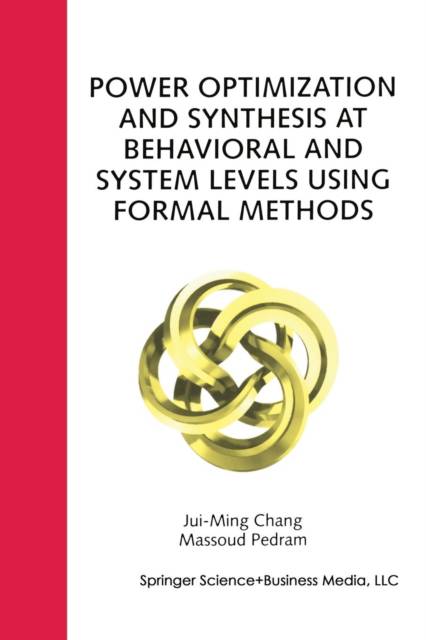
- Retrait gratuit dans votre magasin Club
- 7.000.000 titres dans notre catalogue
- Payer en toute sécurité
- Toujours un magasin près de chez vous
- Retrait gratuit dans votre magasin Club
- 7.000.0000 titres dans notre catalogue
- Payer en toute sécurité
- Toujours un magasin près de chez vous
Power Optimization and Synthesis at Behavioral and System Levels Using Formal Methods
Jui-Ming Chang, Massoud Pedram
Livre broché | Anglais
125,95 €
+ 251 points
Format
Description
Integrated circuit densities and operating speeds continue to rise at an exponential rate. Chips, however, cannot get larger and faster without a sharp decrease in power consumption beyond the current levels. Minimization of power consumption in VLSI chips has thus become an important design objective. In fact, with the explosive growth in demand for portable electronics and the usual push toward more complex functionality and higher performance, power consumption has in many cases become the limiting factor in satisfying the market demand.
A new generation of power-conscious CAD tools are coming onto the market to help designers estimate, optimize and verify power consumption levels at most stages of the IC design process. These tools are especially prevalent at the register-transfer level and below. There is a great need for similar tools and capabilities at the behavioral and system levels of the design process. Many researchers and CAD tool developers are working on high-level power modeling and estimation, as well as power-constrained high-level synthesis and optimization. Techniques and tools alone are, however, insufficient to optimize VLSI circuit power dissipation - a consistent and convergent design methodology is also required.
Power Optimization and Synthesis at Behavioral and System Levels Using Formal Methods was written to address some of the key problems in power analysis and optimization early in the design process. In particular, this book focuses on power macro-modeling based on regression analysis and power minimization through behavioral transformations, scheduling, resource assignment and hardware/software partitioning and mapping. What differentiates this book from other published work on the subject is the mathematical basis and formalism behind the algorithms and the optimality of these algorithms subject to the stated assumptions.
From the Foreword:
`This book makes animportant contribution to the field of system design technologies by presenting a set of algorithms with guaranteed optimality properties, that can be readily applied to system-level design. This contribution is timely, because it fills the need of new methods for a new design tool generation, which supports the design of electronic systems with even more demanding requirements'.
Giovanni De Micheli, Professor, Stanford University
A new generation of power-conscious CAD tools are coming onto the market to help designers estimate, optimize and verify power consumption levels at most stages of the IC design process. These tools are especially prevalent at the register-transfer level and below. There is a great need for similar tools and capabilities at the behavioral and system levels of the design process. Many researchers and CAD tool developers are working on high-level power modeling and estimation, as well as power-constrained high-level synthesis and optimization. Techniques and tools alone are, however, insufficient to optimize VLSI circuit power dissipation - a consistent and convergent design methodology is also required.
Power Optimization and Synthesis at Behavioral and System Levels Using Formal Methods was written to address some of the key problems in power analysis and optimization early in the design process. In particular, this book focuses on power macro-modeling based on regression analysis and power minimization through behavioral transformations, scheduling, resource assignment and hardware/software partitioning and mapping. What differentiates this book from other published work on the subject is the mathematical basis and formalism behind the algorithms and the optimality of these algorithms subject to the stated assumptions.
From the Foreword:
`This book makes animportant contribution to the field of system design technologies by presenting a set of algorithms with guaranteed optimality properties, that can be readily applied to system-level design. This contribution is timely, because it fills the need of new methods for a new design tool generation, which supports the design of electronic systems with even more demanding requirements'.
Giovanni De Micheli, Professor, Stanford University
Spécifications
Parties prenantes
- Auteur(s) :
- Editeur:
Contenu
- Nombre de pages :
- 167
- Langue:
- Anglais
Caractéristiques
- EAN:
- 9781461373681
- Date de parution :
- 29-10-12
- Format:
- Livre broché
- Format numérique:
- Trade paperback (VS)
- Dimensions :
- 156 mm x 234 mm
- Poids :
- 281 g

Les avis
Nous publions uniquement les avis qui respectent les conditions requises. Consultez nos conditions pour les avis.






